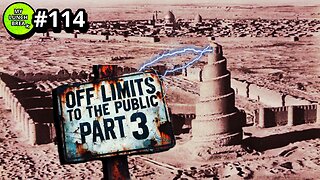Premium Only Content

Relations with the eastern warlords of Al-Muktafi 17th Caliph of Abbasid Caliphate.
@islamichistory813 #AlMuktafi #AbbasidCaliphate #EasternWarlords #Diplomacy #Geopolitics #IslamicHistory #ForeignPolicy #PowerDynamics
Relations with the eastern warlords of Al-Muktafi 17th Caliph of Abbasid Caliphate.
Asslamoalaikum sisters brothers friends and elders, Relations with the eastern warlords of Al-Muktafi, the 17th Caliph of the Abbasid Caliphate, are describing in this informative islamic history video. we are Describing the intricate diplomatic strategies, alliances, and conflicts that shaped the caliph's foreign policy towards the powerful warlords of the East. we are Describing the key players, their agendas, and the impact of these relationships on the geopolitical landscape of the time. Get to know valuable insights into the dynamics of power and influence in this pivotal period of Islamic history.
Al-Mu'tadid had had a turbulent relationship with the Saffarids, who ruled most of Persia: their rule over the eastern parts of the Islamic world was recognized by Baghdad, but the caliph and the Saffarids contested control over western Persia, notably the provinces of Fars and Kirman. In 901, the Saffarids had seized Fars, and repulsed Badr al-Mu'tadidi's attempts to recover it. At the time of al-Muktafi's accession, the Saffarids captured Rayy. A military response was delayed by the affair around Badr al-Mu'tadidi, and it was not until 5 November that troops were sent to the region. The result of the expedition is unknown, however, and it is known that the Samanids captured Rayy in the same year.[35] Like his father before him, al-Muktafi preferred to reach a modus vivendi with the Saffarids, and in the next year confirmed them in their control over Fars.
Baghdad's relations with the quasi-independent ruler of Adharbayjan, Yusuf ibn Abi'l-Saj, had never been settled and became increasingly strained under al-Muktafi. In 908, an army under Hakam al-Muflihi was sent against Ibn Abi'l-Saj, but after al-Muktafi's death soon after, a settlement was reached: Ibn Abi'l-Saj acknowledged caliphal suzerainty and was named governor of Armenia and Adharbayjan.
Qarmatian uprisings
The early caliphates were always threatened by the radical Kharijite sects, which were especially prevalent among the marginalized populations "who inhabited the borderlands between the desert and the sown" and were hostile to the central authorities. During the 9th century, however, a range of new movements emerged on the basis of Shi'ite doctrines, which replaced Kharijism as the main idiom for opposition to established regimes. Zaydi imams had already established independent dynasties in the fringes of the Abbasid empire, in Tabaristan and Yemen , but by the time of al-Muktafi's accession, the core regions of the Caliphate itself were menaced by the Qarmatians, a radical Isma'ili Shi'ite sect. The Qarmatians denounced mainstream Sunni Islam for practices they viewed as deviations from the true teachings of the religion, such as the Hajj and the worship of the Kaaba, as well as the dwelling in cities and the marginalization of the Bedouin. Consequently, the Qarmatians gained many adherents among the latter—although the Qarmatian leadership overwhelmingly came from the urban settlers—and began assaulting the neighbouring Muslim communities. Their missionary efforts soon spread: in 899, the Qarmatians seized Bahrayn, while another base was established in the area around Palmyra. From there the Qarmatians began launching raids against the Abbasid and Tulunid provinces of Syria. In 902, the Qarmatians defeated the increasingly feeble Tulunids and laid siege to Damascus. Although the city withstood the siege, the Qarmatians proceeded to ravage other Syrian towns. At the same time, a Kufan Isma'ili missionary, Abu Abdallah al-Shi'i, made contact with the Kutama Berbers. His proselytization efforts made rapid headway among them, and in 902, he began his attacks on the Aghlabid emirate of Ifriqiya. Its conquest was completed in 909, laying the foundations of the Fatimid Caliphate.
So friends tomorow we will be described Compaign Against Qarmatians of Al-Muktafi 17th Caliph of Abbasid Caliphate.
Allah Hafiz
==============================
-
 17:53
17:53
Forrest Galante
13 hours agoHow I Joined a Dangerous Remote Tribe (feat. Nelk Boys)
55K10 -
 LIVE
LIVE
Vocalot
1 day agoDay 6! New Here! New Rumble Friends!? 🤙
1,741 watching -
 34:27
34:27
The Connect: With Johnny Mitchell
18 hours ago $13.72 earnedCan He Stop Them? Inside Trumps War On Mexican Drug Cartels & The New Era Of Mexican Organized Crime
35.3K22 -
 2:33:15
2:33:15
Tundra Tactical
10 hours ago $12.55 earnedLuis Valdes Of GOA Joins The Worlds Okayest Firearms Live Stream!!!
37.9K -
 1:03:41
1:03:41
Man in America
19 hours agoAre Trump & Musk the COUNTER-ELITES? w/ Derrick Broze
93.8K80 -
 3:45:08
3:45:08
DLDAfterDark
10 hours ago $11.85 earnedDLD Live! SHTF Handguns! Which Would You Choose?
50.8K4 -
 1:50:38
1:50:38
Mally_Mouse
12 hours agoSaturday Shenanigans!! - Let's Play: Mario Party Jamboree
60.1K -
 1:13:00
1:13:00
Patriots With Grit
16 hours agoWill Americans Rise Up? | Jeff Calhoun
49.9K13 -
 14:55
14:55
Exploring With Nug
16 hours ago $11.85 earnedWe Found Semi Truck Containers While Searching for Missing Man!
65K9 -
 27:57
27:57
MYLUNCHBREAK CHANNEL PAGE
1 day agoOff Limits to the Public - Pt 3
151K70